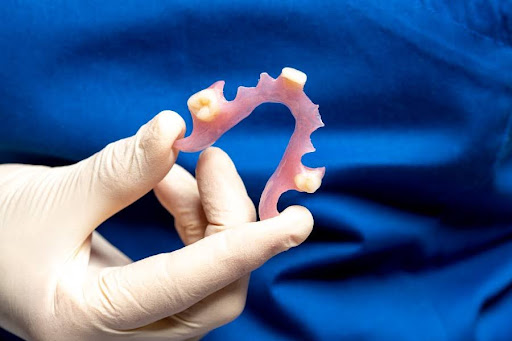Flexible denture are an innovative alternative to traditional rigid dentures, designed to offer greater comfort, improved aesthetics, and ease of use. Made from soft, thermoplastic materials like nylon or polycarbonate, they provide a more natural and adaptable fit, making them an increasingly popular choice for patients with partial tooth loss.
This guide explains everything you need to know about flexible dentures, including their benefits, how they work, and tips for care and maintenance.
What Are Flexible Dentures?
Flexible dentures are a type of removable partial denture made from lightweight, pliable materials. Unlike conventional dentures, which are often made of acrylic or metal, flexible denture contour to the shape of your gums, providing a snug and comfortable fit.
Key Features:
- Constructed from soft, flexible materials like nylon resin.
- Free of metal clasps, making them more discreet.
- Suitable for partial tooth replacements rather than full dentures.
Benefits of Flexible Dentures
1. Comfortable Fit
Flexible dentures adapt to the natural contours of your mouth, reducing irritation and pressure on the gums.
- No Hard Edges: Their soft, pliable design prevents sore spots and discomfort.
- Lightweight: They are significantly lighter than traditional dentures, making them easier to wear.
2. Aesthetic Appeal
The absence of metal clasps gives flexible dentures a more natural appearance.
- Gum-Colored Base: The material blends seamlessly with your gums.
- Discreet: Flexible dentures are less noticeable compared to traditional partial dentures.
3. Durability
Flexible dentures are resistant to cracking and breaking.
- Impact-Resistant: The flexible material can withstand drops or minor impacts.
- Longevity: With proper care, they can last several years.
4. Ideal for Sensitive Mouths
Patients with allergies or sensitivities to acrylic or metal materials can benefit from the hypoallergenic properties of flexible dentures.
How Flexible Dentures Work
Flexible dentures replace one or more missing teeth in the upper or lower jaw.
The Process:
- Consultation: Your dentist will evaluate your oral health and take impressions of your mouth.
- Customization: The dentures are fabricated to match your gums and teeth for a natural look.
- Fitting: Once ready, the dentures are fitted to ensure comfort and proper alignment.
Use:
- They are removable and easy to insert or take out.
- The flexible base ensures they stay securely in place during daily activities like eating and speaking.
Who Can Benefit from Flexible Dentures?
Flexible dentures are ideal for:
- Patients missing one or more teeth but not requiring full dentures.
- Individuals with sensitive gums or allergies to metal and acrylic.
- Those seeking a lightweight and comfortable alternative to traditional dentures.
Limitations of Flexible Dentures
While flexible dentures offer many advantages, they are not suitable for everyone.
- Limited Repairs: They are harder to adjust or repair compared to rigid dentures.
- Partial Coverage: They are designed for partial tooth replacement and not for patients requiring full dentures.
- Cost: Flexible dentures can be more expensive than traditional partial dentures due to the specialized materials used.
How to Care for Flexible Dentures
Proper care is essential to maintain the longevity and performance of your flexible denture.
Daily Cleaning:
- Use a soft-bristle toothbrush and mild, non-abrasive cleaner.
- Avoid harsh chemicals or toothpaste, as they can damage the material.
Soaking:
- Soak your dentures in a denture solution overnight to keep them hydrated and clean.
Handle with Care:
- Although durable, avoid bending or twisting the dentures.
Regular Checkups:
- Visit your dentist regularly to ensure the dentures remain a good fit and your gums stay healthy.
Comparison: Flexible vs. Traditional Dentures
| Feature | Flexible Dentures | Traditional Dentures |
| Material | Nylon or polycarbonate | Acrylic or metal |
| Comfort | High | Moderate |
| Aesthetic Appeal | Metal-free, natural look | Visible metal clasps |
| Durability | Flexible and impact-resistant | Prone to cracking or breaking |
| Maintenance | Requires gentle care | More straightforward |
Conclusion
Flexible dentures provide a comfortable, lightweight, and aesthetically pleasing option for patients needing partial tooth replacements. Their adaptability and discreet design make them a popular choice for those seeking a natural-looking solution to missing teeth.
If you’re considering dentures, consult with your dentist to determine whether flexible dentures are the right fit for your needs. With proper care and regular dental checkups, they can offer a long-lasting and effective solution to restore your smile and confidence.


More Stories
The Importance of Early Detection: How Heart Specialists in Karachi Are Saving Lives
Prime Care on Demand: Exploring the Rise of Mobile Health Solutions
Acupuncture Therapy: A Natural Solution for Pain Relief